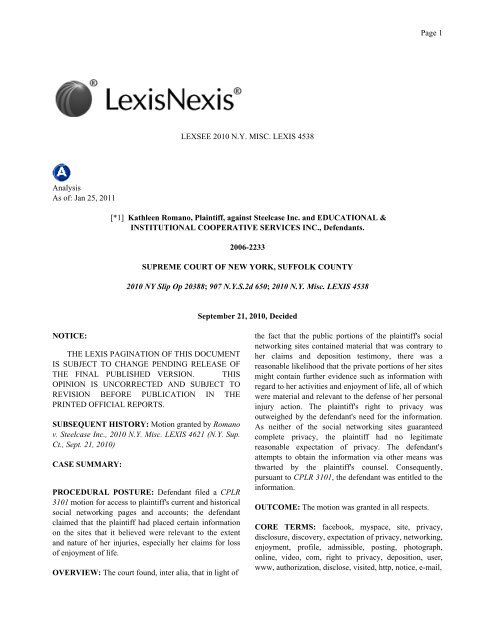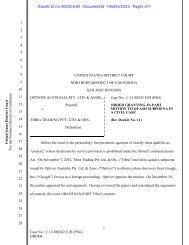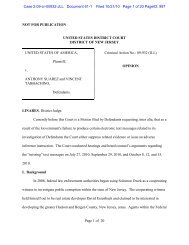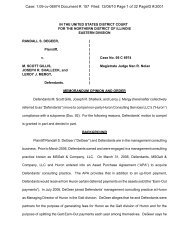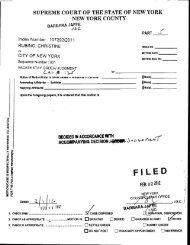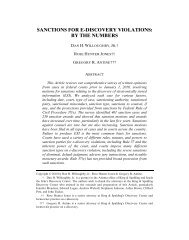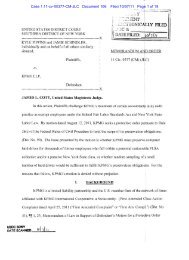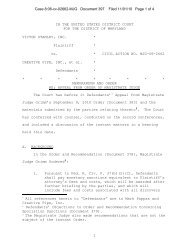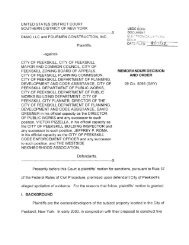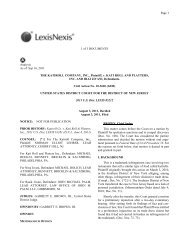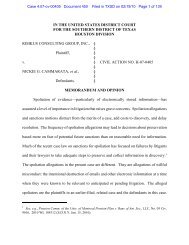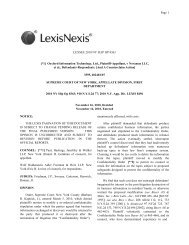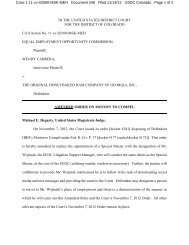Romano v. Steelcase Inc. - E-Discovery Law Alert
Romano v. Steelcase Inc. - E-Discovery Law Alert
Romano v. Steelcase Inc. - E-Discovery Law Alert
Create successful ePaper yourself
Turn your PDF publications into a flip-book with our unique Google optimized e-Paper software.
Page 1<br />
LEXSEE 2010 N.Y. MISC. LEXIS 4538<br />
Analysis<br />
As of: Jan 25, 2011<br />
[*1] Kathleen <strong>Romano</strong>, Plaintiff, against <strong>Steelcase</strong> <strong>Inc</strong>. and EDUCATIONAL &<br />
INSTITUTIONAL COOPERATIVE SERVICES INC., Defendants.<br />
2006-2233<br />
SUPREME COURT OF NEW YORK, SUFFOLK COUNTY<br />
2010 NY Slip Op 20388; 907 N.Y.S.2d 650; 2010 N.Y. Misc. LEXIS 4538<br />
September 21, 2010, Decided<br />
NOTICE:<br />
THE LEXIS PAGINATION OF THIS DOCUMENT<br />
IS SUBJECT TO CHANGE PENDING RELEASE OF<br />
THE FINAL PUBLISHED VERSION. THIS<br />
OPINION IS UNCORRECTED AND SUBJECT TO<br />
REVISION BEFORE PUBLICATION IN THE<br />
PRINTED OFFICIAL REPORTS.<br />
SUBSEQUENT HISTORY: Motion granted by <strong>Romano</strong><br />
v. <strong>Steelcase</strong> <strong>Inc</strong>., 2010 N.Y. Misc. LEXIS 4621 (N.Y. Sup.<br />
Ct., Sept. 21, 2010)<br />
CASE SUMMARY:<br />
PROCEDURAL POSTURE: Defendant filed a CPLR<br />
3101 motion for access to plaintiff's current and historical<br />
social networking pages and accounts; the defendant<br />
claimed that the plaintiff had placed certain information<br />
on the sites that it believed were relevant to the extent<br />
and nature of her injuries, especially her claims for loss<br />
of enjoyment of life.<br />
OVERVIEW: The court found, inter alia, that in light of<br />
the fact that the public portions of the plaintiff's social<br />
networking sites contained material that was contrary to<br />
her claims and deposition testimony, there was a<br />
reasonable likelihood that the private portions of her sites<br />
might contain further evidence such as information with<br />
regard to her activities and enjoyment of life, all of which<br />
were material and relevant to the defense of her personal<br />
injury action. The plaintiff's right to privacy was<br />
outweighed by the defendant's need for the information.<br />
As neither of the social networking sites guaranteed<br />
complete privacy, the plaintiff had no legitimate<br />
reasonable expectation of privacy. The defendant's<br />
attempts to obtain the information via other means was<br />
thwarted by the plaintiff's counsel. Consequently,<br />
pursuant to CPLR 3101, the defendant was entitled to the<br />
information.<br />
OUTCOME: The motion was granted in all respects.<br />
CORE TERMS: facebook, myspace, site, privacy,<br />
disclosure, discovery, expectation of privacy, networking,<br />
enjoyment, profile, admissible, posting, photograph,<br />
online, video, com, right to privacy, deposition, user,<br />
www, authorization, disclose, visited, http, notice, e-mail,
2010 NY Slip Op 20388, *1; 907 N.Y.S.2d 650, **;<br />
2010 N.Y. Misc. LEXIS 4538, ***<br />
Page 2<br />
personal information, deleted, sharing, network<br />
LexisNexis(R) Headnotes<br />
Communications <strong>Law</strong> > Privacy > Stored<br />
Communications Act<br />
[HN1] The Stored Communications Act, 18 U.S.C.S. §<br />
2701 et seq., prohibits an entity, such as Facebook and<br />
MySpace, from disclosing such information without the<br />
consent of the owner of the account. 18 U.S.C.S. §<br />
2702(b)(3).<br />
Civil Procedure > Judicial Officers > Judges ><br />
Discretion<br />
Civil Procedure > <strong>Discovery</strong> > Disclosures > Mandatory<br />
Disclosures<br />
[HN2] Pursuant to CPLR 3101, there shall be full<br />
disclosure of all nonprivileged matter that is material and<br />
necessary to the defense or prosecution of an action. To<br />
this end, trial courts have broad discretion in the<br />
supervision of discovery, and in determining what is<br />
material and necessary.<br />
to proof that is admissible but also to matters that may<br />
lead to the disclosure of admissible proof.<br />
Civil Procedure > <strong>Discovery</strong> > Disclosures > General<br />
Overview<br />
Civil Procedure > <strong>Discovery</strong> > Relevance<br />
[HN5] Disclosure extends not only to admissible proof,<br />
but also to testimony or documents that may lead to the<br />
disclosure of admissible proof, including materials that<br />
may be used in cross-examination.<br />
Civil Procedure > <strong>Discovery</strong> > Disclosures > General<br />
Overview<br />
Civil Procedure > <strong>Discovery</strong> > Relevance<br />
Torts > Damages > Compensatory Damages > General<br />
Overview<br />
[HN6] Plaintiffs who place their physical condition in<br />
controversy, may not shield from disclosure material that<br />
is necessary to the defense of the action. Accordingly, in<br />
an action seeking damages for personal injuries,<br />
discovery is generally permitted with respect to materials<br />
that may be relevant both to the issue of damages and the<br />
extent of a plaintiff's injury, including the plaintiff's claim<br />
for loss of enjoyment of life.<br />
Civil Procedure > <strong>Discovery</strong> > Disclosures > General<br />
Overview<br />
Civil Procedure > <strong>Discovery</strong> > Relevance<br />
[HN3] Within the context of discovery, "necessary" has<br />
been interpreted as meaning needful and not<br />
indispensable. The "material and necessary" standard is<br />
to be interpreted liberally requiring disclosure of any<br />
facts bearing on the controversy that will assist<br />
preparation for trial by sharpening the issues and<br />
reducing delay and prolixity. The test is one of usefulness<br />
and reason.<br />
Civil Procedure > <strong>Discovery</strong> > Disclosures > General<br />
Overview<br />
Civil Procedure > <strong>Discovery</strong> > Relevance<br />
[HN4] Each discovery request is to be decided on a case<br />
by case basis keeping in mind the strong public policy in<br />
favor of open disclosure. If the information sought is<br />
sufficiently related to the issues in litigation so as to<br />
make the effort to obtain it in preparation for trial<br />
reasonable, then discovery should be permitted. It is<br />
immaterial that the information sought may not be<br />
admissible at trial as pretrial discovery extends not only<br />
Civil Procedure > <strong>Discovery</strong> > Disclosures > General<br />
Overview<br />
Civil Procedure > <strong>Discovery</strong> > Relevance<br />
[HN7] CPLR 3101(i) is broad enough to encompass any<br />
film, photograph, or videotape involving a person<br />
referred to in CPLR 3101(a)(1), i.e., a party. This is<br />
consistent with the general policy of New York courts<br />
allowing liberal disclosure. Moreover, the 1993 addition<br />
of subdivision (i) only strengthens the argument for open<br />
disclosure.<br />
Civil Procedure > <strong>Discovery</strong> > Disclosures > General<br />
Overview<br />
Civil Procedure > <strong>Discovery</strong> > Relevance<br />
Communications <strong>Law</strong> > Privacy > Stored<br />
Communications Act<br />
[HN8] To permit a party claiming very substantial<br />
damages for loss of enjoyment of life to hide behind<br />
self-set privacy controls on a website, the primary<br />
purpose of which is to enable people to share information<br />
about how they lead their social lives, risks depriving the<br />
opposite party of access to material that may be relevant
2010 NY Slip Op 20388, *1; 907 N.Y.S.2d 650, **;<br />
2010 N.Y. Misc. LEXIS 4538, ***<br />
Page 3<br />
to ensuring a fair trial.<br />
Constitutional <strong>Law</strong> > Substantive Due Process ><br />
Privacy > General Overview<br />
[HN9] In New York, there is no common law right to<br />
privacy.<br />
Constitutional <strong>Law</strong> > Substantive Due Process ><br />
Privacy > General Overview<br />
Constitutional <strong>Law</strong> > Substantive Due Process > Scope<br />
of Protection<br />
[HN10] The Fourth Amendment's right to privacy,<br />
protects people, not places.<br />
Constitutional <strong>Law</strong> > Substantive Due Process ><br />
Privacy > General Overview<br />
Constitutional <strong>Law</strong> > Substantive Due Process > Scope<br />
of Protection<br />
[HN11] What a person knowingly exposes to the public,<br />
even in his own home or office, is not a subject of Fourth<br />
Amendment protection.<br />
Constitutional <strong>Law</strong> > Substantive Due Process ><br />
Privacy > General Overview<br />
Constitutional <strong>Law</strong> > Substantive Due Process > Scope<br />
of Protection<br />
[HN12] In determining whether a right to privacy exists<br />
via the Fourth Amendment, courts apply a reasonableness<br />
standard: first, a person must have exhibited an actual<br />
(subjective) expectation of privacy and, second, the<br />
expectation must be one that society is prepared to<br />
recognize as reasonable.<br />
Constitutional <strong>Law</strong> > Substantive Due Process ><br />
Privacy > General Overview<br />
Constitutional <strong>Law</strong> > Substantive Due Process > Scope<br />
of Protection<br />
[HN13] Individuals do not enjoy an expectation of<br />
privacy in internet postings or e-mails that have reached<br />
their recipients.<br />
Communications <strong>Law</strong> > Privacy > Stored<br />
Communications Act<br />
Constitutional <strong>Law</strong> > Substantive Due Process ><br />
Privacy > General Overview<br />
Constitutional <strong>Law</strong> > Substantive Due Process > Scope<br />
of Protection<br />
[HN14] No person would have reasonable expectation of<br />
privacy where person took affirmative act of posting own<br />
writing on MySpace, making it available to anyone with a<br />
computer and opening it up to public eye.<br />
COUNSEL: [***1] Kelner & Kelner Esqs, New York,<br />
New York.<br />
Gallagher Gosseen Faller & Crowley Esqs, Garden City,<br />
New York.<br />
John T Ryan & Associates, Riverhead, New York.<br />
Orrick Herrington & Sutcliffe LLP, New York, New<br />
York.<br />
JUDGES: HON. JEFFREY ARLEN SPINNER, JSC.<br />
OPINION BY: JEFFREY ARLEN SPINNER<br />
OPINION<br />
[**651] Jeffrey Arlen Spinner, J.<br />
ORDERED, that Defendant STEELCASE's motion<br />
is hereby granted as set forth herein below.<br />
Defendant STEELCASE moves this Court for an<br />
Order granting said Defendant access to Plaintiff's current<br />
and historical Facebook and MySpace pages and<br />
accounts, including all deleted pages and related<br />
information upon the grounds that Plaintiff has placed<br />
certain information on these social networking sites<br />
which are believed to be inconsistent with her claims in<br />
this action concerning the extent and nature of her<br />
injuries, especially her claims for loss of enjoyment of<br />
life.<br />
The present application was brought on by Order to<br />
Show Cause. The Court has [**652] reviewed the<br />
submissions both in favor of and in opposition to the<br />
relief sought, as well as the applicable federal statutory<br />
law, specifically [HN1] the Stored [*2]<br />
Communications Act, 18 U.S.C. § 2701 et seq., which<br />
prohibits an entity, such as Facebook and MySpace from<br />
disclosing such [***2] information without the consent<br />
of the owner of the account (see, 18 U.S.C. P 2702(b)(3);<br />
Flagg v City of Detroit, 252 F.R.D. 346, 352 [ED Mich<br />
2008]).<br />
SCOPE OF PERMISSIBLE DISCOVERY
2010 NY Slip Op 20388, *2; 907 N.Y.S.2d 650, **652;<br />
2010 N.Y. Misc. LEXIS 4538, ***2<br />
Page 4<br />
[HN2] Pursuant to CPLR 3101, there shall be full<br />
disclosure of all non privileged matter which is material<br />
and necessary to the defense or prosecution of an action.<br />
To this end, trial courts have broad discretion in the<br />
supervision of discovery, and in determining what is<br />
"material and necessary" (see: Allen v Crowell Collier<br />
Pub Co, 21 NY2d 403, 235 N.E.2d 430, 288 N.Y.S.2d 449<br />
[1968]; Andon v 302-304 Mott Street Assocs, 94 NY2d<br />
740, 731 N.E.2d 589, 709 N.Y.S.2d 873 [2000];<br />
Cabellero v City of New York, 48 AD3d 727, 853<br />
N.Y.S.2d 165 (2 Dept 2008). [HN3] Within the context of<br />
discovery, "necessary" has been interpreted as meaning<br />
"needful and not indispensable" (see: Allen at 407, 453).<br />
The "material and necessary"standard is to be interpreted<br />
liberally requiring disclosure of "any facts bearing on the<br />
controversy which will assist preparation for trial by<br />
sharpening the issues and reducing delay and prolixity.<br />
The test is one of usefulness and reason" (see: Allen,<br />
supra; Andon, supra; Hoenig v. Westphal, 52 N.Y.2d<br />
605, 422 N.E.2d 491, 439 N.Y.S.2d 831 [1981] (pre-trial<br />
discovery is to be encouraged, limited only by the test of<br />
materiality of "usefulness [***3] and reason")).<br />
[HN4] Each discovery request is to be decided on a<br />
case by case basis keeping in mind the strong public<br />
policy in favor of open disclosure (see: Andon at 747,<br />
878). If the information sought is sufficiently related to<br />
the issues in litigation so as to make the effort to obtain it<br />
in preparation for trial reasonable, then discovery should<br />
be permitted (see: Allen at 406-407, 452; In re Beryl,<br />
118 AD2d 705, 499 N.Y.S.2d 980 [2 Dept 1986]). It is<br />
immaterial that the information sought may not be<br />
admissible at trial as "pretrial discovery extends not only<br />
to proof that is admissible but also to matters that may<br />
lead to the disclosure of admissible proof" (see: Twenty<br />
Four Hour Fuel Oil Corp v Hunter Ambulance <strong>Inc</strong>, 226<br />
AD2d 175, 640 N.Y.S.2d 114 [1 Dept 1996]; Polygram<br />
Holding <strong>Inc</strong> v Cafaro, 42 AD3d 339, 839 N.Y.S.2d 493 [1<br />
Dept 2007] ([HN5] disclosure extends not only to<br />
admissible proof but also to testimony or documents<br />
which may lead to the disclosure of admissible proof<br />
including materials which may be used in<br />
cross-examination")).<br />
INFORMATION SOUGHT FROM INTERNET<br />
SITES<br />
Hoenig v Westphal, supra [***4] ). Accordingly, in an<br />
action seeking damages for personal injuries, discovery is<br />
generally permitted with respect to materials that may be<br />
relevant both to the issue of damages and the extent of a<br />
plaintiff's injury (see: Walker v City of New York, 205<br />
AD2d 755, 614 N.Y.S.2d 31 [2 Dept 1994]) including a<br />
plaintiff's claim for loss of enjoyment of life (see:<br />
Orlando v Richmond Precast <strong>Inc</strong>, 53 AD3d 534, 861<br />
N.Y.S.2d 765 [2 Dept 2008] (in an action to recover<br />
damages for personal injuries, records sought were<br />
material and necessary to the defense [**653] regarding<br />
plaintiff's claim of loss of enjoyment of life); Vanalst v<br />
City of New York, 276 AD2d 789, 715 N.Y.S.2d 422 [2<br />
Dept 2000); Mora v St Vincent's Catholic Med Ctr, 8<br />
Misc 3d 868, 800 N.Y.S.2d 298 [Sup Ct NY Co 2005).<br />
Thus, in Sgambelluri v Recinos, 192 Misc 2d 777,<br />
747 N.Y.S.2d 330 (Sup Ct Nassau Co 2002), an action<br />
arising out of a motor vehicle accident, the court held that<br />
plaintiff's wedding video taken two years after the<br />
incident was clearly relevant to the claim of permanency<br />
of injuries. As a result of the accident, plaintiff alleged<br />
that she sustained permanent injuries to her neck and<br />
back, and testified at her deposition that she can no<br />
longer participate in certain activities such as running or<br />
horseback riding. [***5] Defendant sought a copy of her<br />
wedding video on the basis that it might have shown<br />
plaintiff in various activities such as dancing, which<br />
would be relevant to the claims. Plaintiff objected on the<br />
basis of the personal nature of the video. The court<br />
decided in favor of disclosure noting its relevancy to the<br />
claim of permanency of injuries. In so finding, the court<br />
reasoned that although the video is not a surveillance<br />
tape, as contemplated by CPLR § 3101(i), its:<br />
[L]anguage [HN7] is broad enough to<br />
encompass any film, photograph or<br />
videotape... involving a person referred to<br />
in paragraph one of subdivision (a), i.e., a<br />
party. This is consistent with the general<br />
policy of New York courts allowing<br />
liberal disclosure. Moreover, the 1993<br />
addition of subdivision (i) only<br />
strengthens the argument for open<br />
disclosure. Id. at 779, 332 [*3] (internal<br />
quotations omitted)<br />
[HN6] Plaintiffs who place their physical condition<br />
in controversy, may not shield from disclosure material<br />
which is necessary to the defense of the action (see:<br />
.<br />
Like the plaintiff in Sgambelluri, Plaintiff herein
2010 NY Slip Op 20388, *3; 907 N.Y.S.2d 650, **653;<br />
2010 N.Y. Misc. LEXIS 4538, ***5<br />
Page 5<br />
also claims she sustained permanent injuries as a result of<br />
the incident and that she can no longer participate in<br />
certain activities or that these injuries have effected her<br />
enjoyment of life. However, contrary to Plaintiff's claims,<br />
<strong>Steelcase</strong> contends that a review of the public portions<br />
[***6] of Plaintiff's MySpace and Facebook pages<br />
reveals that she has an active lifestyle and has traveled to<br />
Florida and Pennsylvania during the time period she<br />
claims that her injuries prohibited such activity. In light<br />
of this, Defendant sought to question Plaintiff at her<br />
deposition regarding her MySpace and Facebook<br />
accounts, to no avail and following those depositions,<br />
served Plaintiff with a Notice for <strong>Discovery</strong> & Inspection<br />
requesting, inter alia, "authorizations to obtain full access<br />
to and copies of Plaintiff's current and historical<br />
records/information on her Facebook and MySpace<br />
accounts." Plaintiff has refused to provide the requested<br />
authorizations.<br />
Both Facebook and MySpace are social networking<br />
sites where people can share information about their<br />
personal lives, including posting photographs and sharing<br />
information about what they are doing or thinking.<br />
Indeed, Facebook policy states that "it helps you share<br />
information with your friends and people around you,"<br />
and that "Facebook is about sharing information with<br />
others." 1 Likewise, MySpace is a "social networking<br />
service that allows Members to create unique personal<br />
profiles online in order to find and communicate with old<br />
[***7] and news friends;" and, is self-described as an<br />
"online community" where "you can share photos,<br />
journals and interests with your growing network of<br />
mutual friends," 2 and, as a "global lifestyle portal<br />
[**654] that reaches millions of people around the<br />
world." 3 Both sites allow the user to set privacy levels to<br />
control with whom they share their information.<br />
1 Facebook<br />
Principles-http:www.facebook.com/policy. php<br />
(last visited April 3, 2009).<br />
2 Us-MySpace.com/index.dfm?fuseaction=misc<br />
.aboutus (last visited June 16, 2009)<br />
3 MySpace Safety<br />
Highlights-http://www.myspace.com/index.<br />
cfm?frseaction=cms.veiwpage & placement<br />
safety (last visited June 18, 2009)<br />
The information sought by Defendant regarding<br />
Plaintiff's Facebook and MySpace accounts is both<br />
material and necessary to the defense of this action and/or<br />
could lead to admissible evidence. In this regard, it<br />
appears that Plaintiff's public profile page on Facebook<br />
shows her smiling happily in a photograph outside the<br />
confines of her home despite her claim that she has<br />
sustained permanent injuries and is largely confined to<br />
her house and bed. In light of the fact that the public<br />
portions of Plaintiff's social networking sites contain<br />
material that [***8] is contrary to her claims and<br />
deposition testimony, there is a reasonable likelihood that<br />
the private portions of her sites may contain further<br />
evidence such as information with regard to her activities<br />
and enjoyment of life, all of which are material and<br />
relevant to the defense of this action. Preventing<br />
Defendant from accessing to Plaintiff's private postings<br />
on Facebook and MySpace would be in [*4] direct<br />
contravention to the liberal disclosure policy in New<br />
York State.<br />
Although there is no New York case law directly<br />
addressing the issues raised by this application, there are<br />
instructive cases from other jurisdictions. Recently, in<br />
Ledbetter v Wal Mart Stores <strong>Inc</strong>, (06 cv 01958<br />
WYD-MJW, 2009 U.S. Dist. LEXIS 126859 [D Colo April<br />
21, 2009]), defendant store sought, via subpoena,<br />
production of the content of plaintiffs' social networking<br />
sites. 4 Information contained on the public access areas<br />
contradicted plaintiffs allegations regarding the effect of<br />
their injuries on their daily lives. When the networking<br />
sites refused to provide the information absent plaintiffs'<br />
consent or request, defendant moved to compel<br />
production and plaintiffs moved for a protective order.<br />
Both plaintiffs had claimed physical and psychological<br />
[***9] injuries as a result of the accident which gave rise<br />
to lawsuit. By Order dated April 21, 2009, Magistrate<br />
Judge Watnabe denied plaintiffs' motion and held that the<br />
information sought by the subpoenas was "reasonably<br />
calculated to lead to the discovery of admissible evidence<br />
and is relevant to the issues in the case."<br />
4 Facebook, MySpace and Meetup.com<br />
Likewise, in Leduc v Roman, 2009 CarswellOnt 843<br />
(February 20, 2009), a matter pending in the Superior<br />
Court of Justice, Ontario, Canada, defendant also<br />
requested production of the plaintiff's Facebook pages,<br />
including, private pages. Plaintiff claimed that as a result<br />
of injuries allegedly sustained in a car accident, his<br />
enjoyment for life had lessened. Canadian law requires<br />
that each party disclose every document relating to any<br />
matter in the action over which he has possession or
2010 NY Slip Op 20388, *4; 907 N.Y.S.2d 650, **654;<br />
2010 N.Y. Misc. LEXIS 4538, ***9<br />
Page 6<br />
control absent a claim of privilege. Plaintiff had failed to<br />
disclose the information which defendant only learned<br />
about following a defense psychiatric examination. After<br />
only being able to access the limited portions of plaintiff's<br />
public profile page, defendant sought an order requiring<br />
production of all site materials as well as preservation of<br />
the materials. [***10] The decision denying the request<br />
was reversed on appeal, with the appellate court<br />
disagreeing that defendant was on a fishing expedition. In<br />
this regard, Judge Brown noted that it was "beyond<br />
controversy" that a person's Facebook pages may contain<br />
relevant documents (at P 23); that other Canadian<br />
[**655] cases had permitted into evidence photographs<br />
posted on a person's Facebook page showing them<br />
engaged in activities despite their claim to the contrary;<br />
and, it is reasonable to infer from the social networking<br />
purpose of Facebook, that even if a person only maintains<br />
a private profile with the public profile merely listing<br />
their name, that relevant information exists on their<br />
limited-access private pages (at P 36). In deciding to<br />
permit the examination into the private Facebook profile,<br />
the court set forth:<br />
[HN8] To permit a party claiming very substantial<br />
damages for loss of enjoyment of life to hide behind<br />
self-set privacy controls on a website, the primary<br />
purpose of which is to enable people to share information<br />
about how they lead their social lives, risks depriving the<br />
opposite party of access to material that may be relevant<br />
to ensuring a fair trial.<br />
(see also: Kent v Laverdiere, 2009 CanLII [***11]<br />
16741 (ON S.C., April 14, 2009) (as plaintiff asserted<br />
that accident disfigured her and lessened her enjoyment<br />
of life, any photos on Facebook or [*5] MySpace<br />
showing her in healthy state, enjoying life, would be<br />
relevant); Bishop v Minichiello, 2009 BCSC 358<br />
(CanLII, April 7, 2009) (defendant's motion for<br />
production of plaintiff's computer's hardrive so it could<br />
analyze how much time plaintiff spent on Facebook<br />
granted as the information sought was relevant to the<br />
issues in the case); Goodridge v King, 2007 CanLII<br />
51161 (ON S.C. October 30, 2007)(in action in which<br />
plaintiff claimed various injuries including loss of<br />
enjoyment of life and disfigurement following a car<br />
accident, photos posted by plaintiff on her Facebook<br />
account was evidence to the contrary, showing her<br />
socializing and dating); Kourtesis v Horis, 2007 CanLII<br />
39367 (ON S.C. September 24, 2007) (in proceeding<br />
concerning costs, court noted that during trial, Facebook<br />
photos of plaintiff were important element of case;<br />
apparently plaintiff testified that she no longer had a<br />
social life because of her injuries, yet the photographs<br />
taken after the accident, showed her at a party) 5 .<br />
5 See, Charles Foster, Uncovering the<br />
Truth:Social [***12] Networks are a Treasure<br />
Trove of Information, Claims Canada,<br />
October/November 2008,<br />
http:www.claimscanada.ca. (last viewed June 18,<br />
2009).<br />
Thus, it is reasonable to infer from the limited<br />
postings on Plaintiff's public Facebook and MySpace<br />
profile pages, that her private pages may contain<br />
materials and information that are relevant to her claims<br />
or that may lead to the disclosure of admissible evidence.<br />
To deny Defendant an opportunity access to these sites<br />
not only would go against the liberal discovery policies<br />
of New York favoring pre-trial disclosure, but would<br />
condone Plaintiff's attempt to hide relevant information<br />
behind self-regulated privacy settings.<br />
PLAINTIFF'S PRIVACY CONCERNS<br />
Production of Plaintiff's entries on her Facebook and<br />
MySpace accounts would not be violative of her right to<br />
privacy 6 , and any such concerns are out weighed by<br />
Defendant's need for the information.<br />
6 [HN9] In New York, there is no common law<br />
right to privacy. See, Cordero v. NYP Holdings,<br />
<strong>Inc</strong>., 20 Misc 3d 1108A, 866 NYS2d 90 (Sup. Ct.<br />
NY Co. 2008).<br />
[HN10] The Fourth Amendment's right to privacy,<br />
protects people, not places (see: Katz v United States,<br />
389 US 347, 88 S. Ct. 507, 19 L. Ed. 2d 576 [1967])<br />
([HN11] "What a person knowingly exposes to the<br />
public, [***13] even in his own home or office, is not a<br />
subject of Fourth Amendment protection.") [HN12] In<br />
determining whether a right to privacy exists via the<br />
Fourth Amendment, courts apply the reasonableness<br />
standard set forth in the concurring opinion of Justice<br />
[**656] Harlan in Katz: "first that a person have<br />
exhibited an actual (subjective) expectation of privacy<br />
and, second, that the expectation be one that society is<br />
prepared to recognize as reasonable." Id. at 361, 516<br />
(Harlan, J. concurring) (internal quotations omitted).<br />
New York courts have yet to address whether there
2010 NY Slip Op 20388, *5; 907 N.Y.S.2d 650, **656;<br />
2010 N.Y. Misc. LEXIS 4538, ***13<br />
Page 7<br />
exists a right to privacy regarding what one posts on their<br />
online social networking pages such as Facebook and<br />
MySpace. However, [*6] whether one has a reasonable<br />
expectation of privacy in internet postings or e-mails that<br />
have reached their recipients has been addressed by the<br />
Second Circuit, which has held that [HN13] individuals<br />
may not enjoy such an expectation of privacy (see: US v<br />
Lifshitz, 369 F3d 173, 2004 U.S. App. LEXIS 9071 [2 Cir<br />
2004) citing Guest v Leis, 255 F3d 325 [6 Cir 2001]):<br />
Users would logically lack a legitimate expectation<br />
of privacy in materials intended for publication or public<br />
posting. They would lose a legitimate expectation<br />
[***14] of privacy in an e-mail that had already reached<br />
its recipient; at this moment, the e-mailer would be<br />
analogous to a letter-writer whose expectation of privacy<br />
ordinarily terminates upon delivery of the letter."<br />
Likewise, whether one has a reasonable expectation<br />
of privacy in e-mails and other writings that have been<br />
shared with others, including entries on Facebook and<br />
MySpace, has been addressed by the United States<br />
District Court of New Jersey, which ordered such entries<br />
produced in Beye v Horizon Blue Cross Blue Shield of<br />
New Jersey, 568 F. Supp. 2d 556 (D NJ 2008). In this<br />
regard, the court stated that "[t]he privacy concerns are<br />
far less where the beneficiary herself chose to disclose<br />
the information." As to the entries which had not been<br />
shared with others, they were to be preserved. At issue in<br />
Beye, were online journals and diary entries of minor<br />
children who had been denied health care benefits for<br />
their eating disorders (see also: Moreno v Hanford<br />
Sentinel <strong>Inc</strong>, 172 Cal. App. 4th 1125, 91 Cal. Rptr. 3d<br />
858, 2009 Cal App. LEXIS 472 [Ct App. 5 Dist 2009)<br />
([HN14] no person would have reasonable expectation of<br />
privacy where person took affirmative act of posting own<br />
writing on MySpace, making it available to anyone with a<br />
computer [***15] and opening it up to public eye);<br />
Dexter v Dexter, 2007 Ohio 2568, 2007 Ohio App LEXIS<br />
2388 (Ohio Ct App Portage Co 2007) (no reasonable<br />
expectation of privacy regarding MySpace writings open<br />
to public view).<br />
Indeed, as neither Facebook nor MySpace guarantee<br />
complete privacy, Plaintiff has no legitimate reasonable<br />
expectation of privacy. In this regard, MySpace warns<br />
users not to forget that their profiles and MySpace forums<br />
are public spaces 7 , and Facebook's privacy policy set<br />
forth, inter alia, that:<br />
You post User Content . . . on the Site at your own<br />
risk. Although we allow you to set privacy options that<br />
limit access to your pages, please be aware that no<br />
security measures are perfect or impenetrable.<br />
7 MySpace General<br />
Tips-http://www.myspace.com/index.cfm?fr<br />
seaction=cms.veiwpage & placement safety<br />
pagetips (last visited June 18, 2009).<br />
Further that:<br />
When you use Facebook, certain information you<br />
post or share with third parties (e.g., a friend or someone<br />
in your network), such as personal information,<br />
comments, messages, photos, videos . . . may be shared<br />
with others in accordance with the privacy settings you<br />
select. All such sharing of information is done at your<br />
own risk. Please keep in mind that [***16] if [*7] you<br />
disclose personal information in you profile or when<br />
posting comments, [**657] messages, photos, videos,<br />
Marketplace listing or other items, this information may<br />
become publicly available. 8<br />
8 Facebook Principles-effective as November<br />
26, 2008-http://www.facebook.com/policy.php.<br />
last viewed June 18, 2009.<br />
Thus, when Plaintiff created her Facebook and<br />
MySpace accounts, she consented to the fact that her<br />
personal information would be shared with others,<br />
notwithstanding her privacy settings. Indeed, that is the<br />
very nature and purpose of these social networking sites<br />
else they would cease to exist. Since Plaintiff knew that<br />
her information may become publicly available, she<br />
cannot now claim that she had a reasonable expectation<br />
of privacy. As recently set forth by commentators<br />
regarding privacy and social networking sites, given the<br />
millions of users, "[i]n this environment, privacy is no<br />
longer grounded in reasonable expectations, but rather in<br />
some theoretical protocol better known as wishful<br />
thinking." 9<br />
9 Dana L. Flemming and Josheph M. Herlihy,<br />
Department: Heads Up: What Happens When the<br />
College Rumor Mill Goes OnLine? Privacy,<br />
Defamation and Online Social Networking Sites,<br />
53 B.B.J. 16 (January/February, 2009).<br />
Further, [***17] Defendant's need for access to the<br />
information outweighs any privacy concerns that may be<br />
voiced by Plaintiff. Defendant has attempted to obtain the
2010 NY Slip Op 20388, *7; 907 N.Y.S.2d 650, **657;<br />
2010 N.Y. Misc. LEXIS 4538, ***17<br />
Page 8<br />
sought after information via other means e.g., via<br />
deposition and notice for discovery, however, these have<br />
proven to be inadequate since counsel has thwarted<br />
Defendant's attempt to question Plaintiff in this regard or<br />
to obtain authorizations from Plaintiff for the release of<br />
this information. The materials including photographs<br />
contained on these sites may be relevant to the issue of<br />
damages and may disprove Plaintiff's claims. Without<br />
access to these sites, Defendant will be at a distinct<br />
disadvantage in defending this action.<br />
ORDERED, that Defendant STEELCASE's motion<br />
for an Order granting said Defendant access to Plaintiff's<br />
current and historical Facebook and MySpace pages and<br />
accounts, including all deleted pages and related<br />
information, is hereby granted in all respects; and it is<br />
further<br />
ORDERED, that, within 30 days from the date of<br />
service of a copy of this Order, as directed herein below,<br />
Plaintiff shall deliver to Counsel for Defendant<br />
STEELCASE a properly executed consent and<br />
authorization as may be required by the operators<br />
[***18] of Facebook and MySpace, permitting said<br />
Defendant to gain access to Plaintiff's Facebook and<br />
MySpace records, including any records previously<br />
deleted or archived by said operators; and it is further.<br />
ORDERED, that Counsel for the moving party<br />
herein is hereby directed to serve a copy of this order,<br />
with Notice of Entry, upon Counsel for all the remaining<br />
parties and Non-Party FACEBOOK, within twenty (20)<br />
days of the date this order is entered by the Suffolk<br />
County Clerk.<br />
[*8] Dated: Riverhead, New York<br />
September 21, 2010<br />
HON. JEFFREY ARLEN SPINNER, JSC


